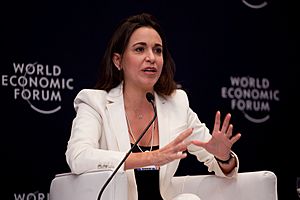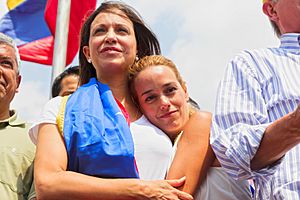María Corina Machado facts for kids
Quick facts for kids
María Corina Machado
|
|
|---|---|
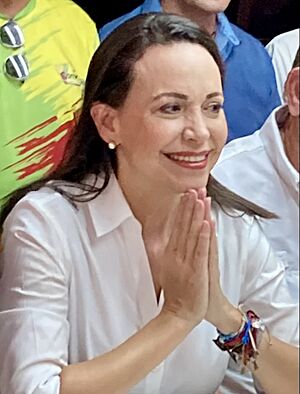
Machado in 2023
|
|
| Member of the National Assembly for Miranda |
|
| In office 5 January 2011 – 21 March 2014 |
|
| Succeeded by | Ricardo Sánchez |
| Personal details | |
| Born |
María Corina Machado Parisca
7 October 1967 Caracas, Venezuela |
| Political party | Vente Venezuela (2012–present) |
| Other political affiliations |
Unitary Platform Democratic Unity Roundtable Súmate (2001–2010) |
| Children | 3 |
| Education | Andrés Bello Catholic University (BS) Institute of Advanced Studies of Administration (MS) |
| Awards |
|
| Signature |  |
María Corina Machado Parisca (born October 7, 1967) is a Venezuelan politician and industrial engineer. She is a well-known leader of the opposition, which is a group of people and parties that have different ideas from the government. She served as a member of Venezuela's National Assembly from 2011 to 2014.
Machado became involved in politics in the early 2000s when she co-founded Súmate, an organization created to make sure elections were fair. She is the leader of the political party Vente Venezuela. In 2014, she helped lead protests against the government of President Nicolás Maduro.
In 2023, Machado won an election to become the main opposition candidate for the 2024 presidential election. However, the Venezuelan government banned her from holding public office. Because she could not run, she supported another candidate, Edmundo González. After the election, Machado had to go into hiding for her safety.
Machado has received many awards for her work. On October 10, 2025, she was awarded the Nobel Peace Prize. The award recognized her "tireless work promoting democratic rights for the people of Venezuela."
Contents
Early Life and Education
Machado was born in Caracas, Venezuela. She is the oldest of four daughters. Her father, Henrique Machado Zuloaga, was a steel businessman, and her mother, Corina Parisca, was a psychologist. Her family has a long history in Venezuela.
Machado earned a degree in industrial engineering from Andrés Bello Catholic University. She also has a master's degree in finance from the Instituto de Estudios Superiores de Administración (IESA) in Caracas. In 2009, she was chosen for the World Fellows Program at Yale University in the United States.
Before entering politics, Machado started a foundation called Fundación Atenea in 1992. The foundation used private donations to help care for homeless children in Caracas. She is a mother of three children.
Súmate and Early Activism
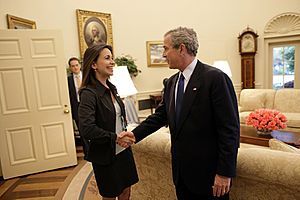
In 2001, Machado co-founded Súmate, a volunteer group that worked to protect the voting process in Venezuela. She said she felt she could not just stay home and watch the country's problems grow. She wanted to give Venezuelans a peaceful way to make changes through voting.
Súmate helped organize a petition for the 2004 Venezuelan recall referendum, which was a vote to decide if President Hugo Chávez should stay in office. Because of her work with Súmate, Machado and other members faced challenges from the government. The government disagreed with Súmate for receiving money from the National Endowment for Democracy (NED), an organization from the United States.
Many international groups and leaders supported Machado. They said the government was trying to scare people in society and stop them from using their democratic rights. In 2005, she met with U.S. President George W. Bush at the White House to talk about her work.
A Career in Politics
Member of the National Assembly
In 2010, Machado ran for a seat in the National Assembly of Venezuela, which is like the congress or parliament of the country. She promised to defend the rights of Venezuelans to think freely and live without fear. She won the election with more votes than any other candidate in the country.
As a member of the National Assembly, she became a strong voice for the opposition. In 2012, during a speech by President Hugo Chávez, she stood up and questioned him about problems in the country, such as crime and shortages of food and other goods.
In 2014, Machado spoke at a meeting of the Organization of American States (OAS) about the protests happening in Venezuela. After her speech, lawmakers who supported the government voted to remove her from the National Assembly. Machado said this was illegal and that there was a "dictatorship in the National Assembly."
Leading Protests
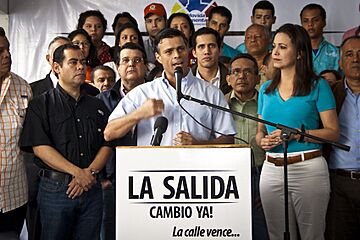
In 2014, large protests took place across Venezuela against President Nicolás Maduro. Machado was one of the main leaders of these demonstrations. Because of her role in the protests, the government began an investigation against her.
The government accused her and other opposition leaders of being part of a plot to remove President Maduro from power. Machado and the others said these accusations were false and were created by the government to distract from the country's real problems.
The Fight for a Fair Election
2023 Presidential Primary
Machado remained a leading figure in the opposition. In 2022, she announced she would run in the 2023 Unitary Platform presidential primaries. This was an election to choose a single candidate to represent the opposition against President Maduro.
She traveled across the country, gaining a lot of support. On October 22, 2023, she won the primary election with over 92% of the vote. This made her the official opposition candidate for the 2024 presidential election.
However, in June 2023, the government had announced that Machado was disqualified, or banned, from holding any public office for 15 years. This decision was confirmed by Venezuela's Supreme Court in January 2024. Many countries and organizations, including the United States, the European Union, and the United Nations, said the ban was unfair and politically motivated.
2024 Presidential Election
Because she was banned from running, Machado chose Corina Yoris to take her place. When Yoris was also blocked from registering, the opposition chose Edmundo González Urrutia as its candidate.
Even though she was not the candidate, Machado was the main leader of the opposition's campaign. She traveled all over Venezuela, holding huge rallies in support of González. Many experts believe that the support for González came from people who followed Machado.
After the election on July 28, 2024, the government announced that Nicolás Maduro had won. However, the opposition, led by Machado and González, said they had proof that González had actually won by a large amount. This led to a major political crisis. On August 1, Machado announced that she had gone into hiding because she feared for her life and freedom.
Political Views
Machado is a strong critic of the government's socialist policies. She supports what she calls "popular capitalism," which focuses on helping individuals and families have more economic freedom and own property. She believes that state-owned companies, like the oil company PDVSA, should be privatized, meaning they would be run by private businesses instead of the government.
She has also supported international pressure on the Venezuelan government to restore democracy.
Awards and Recognition
Machado has received many international awards for her work defending democracy and human rights.
- In 2018, she was named one of the BBC's 100 Women.
- In 2019, she received the Prize for Freedom from Liberal International.
- In 2024, she was awarded the Václav Havel Human Rights Prize by the Council of Europe.
- In 2024, she and Edmundo González were awarded the Sakharov Prize by the European Parliament.
- In 2025, she was listed as one of the 100 most influential people in the world by Time magazine.
Nobel Peace Prize
On October 10, 2025, Machado was awarded the Nobel Peace Prize. The Nobel Committee praised her "for her tireless work promoting democratic rights for the people of Venezuela and for her struggle to achieve a just and peaceful transition from dictatorship to democracy." Many leaders and groups around the world had nominated her for the prize, recognizing her courage and dedication to peace.
Personal Life
Machado is divorced and has three children. Her children live in other countries because of safety concerns in Venezuela.
See also
 In Spanish: María Corina Machado para niños
In Spanish: María Corina Machado para niños
 | Sharif Bey |
 | Hale Woodruff |
 | Richmond Barthé |
 | Purvis Young |


